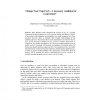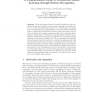784 search results - page 55 / 157 » An underlying model for defeat mechanisms |
AR
2006
15 years 1 months ago
2006
The development and expression of many higher level cognitive functions, such as imitation, spatial perception, and tool-use relies on a multi-modal representation of the body kno...
110
Voted
MABS
2004
Springer
15 years 7 months ago
2004
Springer
Since Holland (1993) introduced the concept of tags as a possible cooperation forming mechanism in evolving system (among other things) a number of tag models with intriguing, and ...
103
click to vote
CAINE
2003
15 years 3 months ago
2003
This paper discusses the development of a computational modeling and analysis toolkit to construct, animate, and biomechanically analyze sophisticated models of vertebrates. Users...
99
Voted
ITS
2010
Springer
15 years 6 months ago
2010
Springer
Accelerated future learning, in which learning proceeds more effectively and more rapidly because of prior learning, is considered to be one of the most interesting measures of ro...
102
click to vote
ATAL
2005
Springer
15 years 7 months ago
2005
Springer
In many negotiation and bargaining scenarios, a particular agent may need to interact repeatedly with another agent. Typically, these interactions take place under incomplete info...


